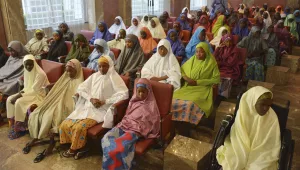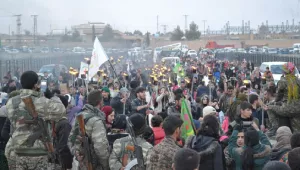BEIRUT—One of the big issues that remain to be resolved across the entire Arab world is how citizens who feel most comfortable participating in public politics through the lens of their Islamic religion can do so with both credibility and safety.
For the past 80 years or so, the Muslim Brotherhood in Egypt and its offshoots in the Arab region have been the main vehicle through which many Muslims combine the expression of their personal piety, moral values, citizen expectations, and political action. Today, this option has become more problematic for many Arabs, both because of the recent incompetence of the Brotherhood in office and the crackdown against it by various regimes, especially in Egypt, the wealthy Gulf countries like Saudi Arabia, the UAE and others.
Egyptian interim president Adly Mansour personifies the anti-Brotherhood stance of the armed forces that now run Egypt. He was installed by armed forces head Field Marshal Abdel Fattah Sisi last August to replace the formerly elected President and Brotherhood leader Mohammad Morsi. On Sunday Mansour said in a television interview that he thought the general public opposes the Brotherhood’s participation in politics because it uses violence. He said that any member of the Brotherhood who renounces violence and gives up membership in the group is welcomed to engage in political action and join the upcoming presidential and parliamentary elections.
"If people are convinced (and vote for them), they are welcome," he said. But he also said that he could not engage the Brotherhood in negotiations because he blamed them for inciting and committing violence after Morsi's ouster. The Sisi-installed government designated the Brotherhood as a terrorist organization and banned it from public activity. Thousands of brotherhood supporters and leaders have also been arrested since July.
The continuing Friday demonstrations and labor strikes across Egypt indicate that not all members of society are pleased with the changes since July. Available indicators suggest significant support simultaneously for military rule through the Sisi-led government, Islamists like the Brotherhood and Salafist groups, and more secular and nationalist groups that failed to consolidate their strength and numbers following the 2011 ouster of the Mubarak government.
Many Arab governments since the 1950s have banned the Muslim Brotherhood, always without permanent success. This is because the Brotherhood and other Islamist groups harness two irrepressible forces: challenging political and socio-economic conditions that subjugate and mistreat most citizens, and the citizens’ sense of hope that divine promise and their own political action will bring about a better, more just, future.
Such attitudes and activism cannot be permanently removed from society as long as political, social and economic conditions remain as they are. The irony is that when the Brotherhood won elections in Egypt, Tunisia, Jordan, Kuwait, Morocco, Yemen and other Arab countries in recent decades, they proved incompetent in responding to citizen grievances. Their own mismanagement of public policy, combined with their apparent thirst for permanent power by trying to dominate all major public offices in Egypt, led to a backlash against them by millions of Egyptians and Tunisians, which led to their ouster.
Arab citizens who voted for Islamists on the basis of combined political-religious attitudes actually judged the Brotherhood’s performance in office on more pragmatic criteria related to whether Islamist-led governments responded to the practical needs of citizens. Religious sloganeering helped get the Brotherhood into office, but it could not maintain them there in the face of their poor performance as incumbent officials.
Banning and jailing the Muslim Brotherhood is a simplistic response to the complex public politics that define Arab societies today. The Brotherhood—like terrorism, mass emigration, corruption and criminal activity—is mostly a symptom of underlying and often chronic problems in society. As long as those problems persist, citizens will find a way to protest and seek change for the better. Egypt also shows that banning the Brotherhood opens space for extremist and militant groups like Ansar Beit Al-Maqdas to attract adherents and use terror against the state and civilians alike.
The Brotherhood failed the test of governments and public officials who deliver on the promise of a more productive, just society with equal opportunity for all. Its supporters and millions of other Arabs still seek a more effective way to harness the power of their faith values and their practical expectations as citizens.
Banning the symptoms of an ailment is an unimpressive response to real national challenges. A better response would be to craft an inclusive, efficient and legitimate political process that allows all citizens to participate peacefully, leading to elected governments that can implement more effective public policies. To date, both the armed forces and the Muslim Brotherhood in Egypt have failed that litmus test.
Rami G. Khouri is Editor-at-large of The Daily Star, and Director of the Issam Fares Institute for Public Policy and International Affairs at the American University of Beirut, in Beirut, Lebanon. You can follow him @ramikhouri.
Article
from
Agence Global
Up Next



